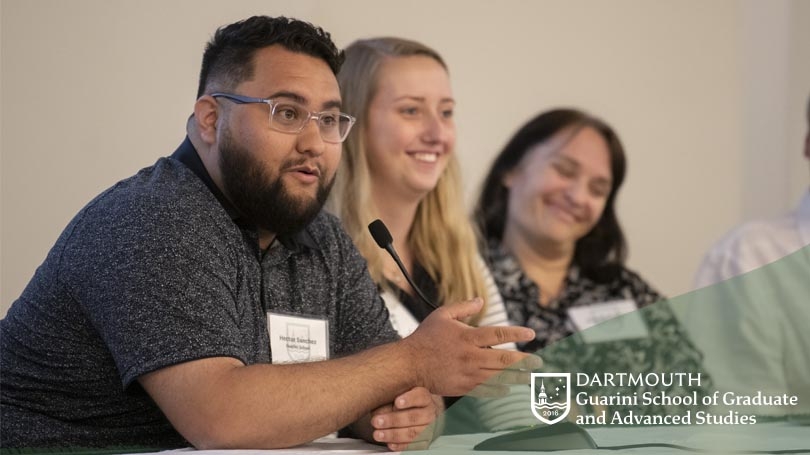In the summer of 2016, when Hector Sanchez arrived on campus to begin pursuing a PhD in microbiology and immunology, he was, at first, uneasy. Born in Guadalajara, Mexico, raised by immigrant parents in a small city outside of Los Angeles, and educated at the University of California at Irvine, he wondered if he would feel out of place at a small, northeastern graduate school in the woods of New Hampshire.
Happily, Sanchez says he got a warm welcome. "I was invited to visit and apply to Dartmouth through UCI's Minority Science Program, and I have loved it here, mainly because of the collaborative atmosphere," he says.
So when Jane Seibel, Guarini's assistant dean of recruiting and diversity, asked him to become a student diversity fellow, Sanchez began accompanying her to recruitment conferences where students from underrepresented groups learn about pathways to advanced degrees. While earning his own PhD, in the wake of the murder of George Floyd by Minneapolis police officer Derek Chauvin, Sanchez helped Seibel launch a series of 13 community town halls aimed at fostering inclusivity and providing a forum for fellow students to share perspectives and voice concerns. "That really helped create conversations and led to diversity initiatives tailored for graduate students and postdocs," he says.
At one of those meetings, Sanchez told a painful, personal story about a day when he and his parents got the cold shoulder at a restaurant. "They didn't want to wait on us," he says. "My dad has very dark skin and that was really upsetting to me, because he had worked so hard to make sure I was the first in our family to attend college, let alone graduate school," he says.
Off-campus moments like that have only deepened Sanchez's determination to make Dartmouth a welcoming place to live, work, and play. For example, as resident fellow at Allen House, he planned lots of get-togethers.
"One that stands out was the Hispanic Heritage Month event he organized last October," says Allen House Professor Janice McCabe, associate professor of sociology. "I was amazed by the number of students who came to eat tacos and paletas, play dominoes and loteria—a game of chance similar to bingo—and enjoy music that they didn't typically hear on campus. As a formal mentor in our Connections Program, Hector also met formally and informally with students, particularly those from underrepresented groups, who were interested in science careers."
Last year, as a newly minted PhD, Sanchez became Guarini's first full-time diversity fellow, a two-year term position which includes running ASURE, a nine-week summer program during which undergraduates from other institutions are invited to conduct research.
Sanchez says putting the welcome mat out for others has helped him find his own place in a tight-knit community whose climate and culture took some getting used to.
"I grew up in the sunshine of L.A., so the seasons of New Hampshire initially threw me off, especially since there isn't much city life. But that's also what helped me focus on doing research, which may be why I was able to complete my PhD in the time that I did."
He's also found time for outdoor sports he'd never tried in southern California. "I didn't think I would like snowboarding, but I do, and I love kayaking," he says.
Although he now holds an advanced degree in microbiology, Sanchez has his eye on a new career. Rather than spending his time in a lab, he now wants to work within an academic administration as an advocate and facilitator of inclusion. This year he's tackling a long-to-do list.
"One of the things that I plan to do this fall is meet with all the underrepresented students who are in the first year of their PhDs here, and just talk to them and see what type of support I can provide," he says. "One of the main things some of us go through as graduate students is 'imposter syndrome'— the feeling that somehow you don't deserve to be in such a competitive program. I would like to help students overcome that and remind them that they belong here for a reason."
Seibel says that's exactly what Sanchez does best.
"His own success story is empowering new graduate students to set lofty goals—and reach them," she says. "He's well respected, he's admired, and he's incredibly kind, thoughtful, and caring. Those are the qualities that are helping him build our community."
